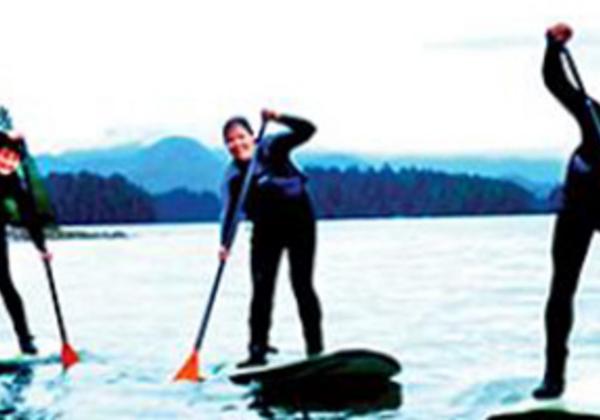Work-Integrated Learning (WIL) at VIU
At VIU, we believe learning is strongest when you can connect what you study in class to real-life experiences. WIL gives you the chance to do just that - through hands-on opportunities that help students, instructors, and employers.
What is WIL?
Work-integrated learning is a type of experiential learning that allows students to get academic credit for applying their learning in a workplace setting. VIU instructors and employers work together to help students gain real-world experience in their field of study.
In intersession and fall 2025
1,979+
VIU students engaged in work-integrated learning
40+
academic programs were represented across all faculties
$346,200
in WIL bursaries were distributed to 197 students in unpaid WIL
49%
of WIL experiences were work-experiences and internships
At VIU, we offer these types of WIL experiences:
Students participating in work experiences complete one or two work terms within their academic program. These work terms can be paid or unpaid and provide experience in a workplace setting related to the student's field of study and/or career goals. Typically, these are competitive experiences, and students apply for and secure their own opportunities. Internships and work experience at VIU are generally a minimum of 120 hours.
Examples of programs at VIU that use work experience include
Provides students with an unpaid, part-time/short term, intensive, hands-on practical experience in a setting relevant to their subject of study. Field placements may not require supervision of a registered or licensed professional and the completed work experience hours are not required for professional certification. Typically students are placed in these opportunities by their VIU faculty or WIL coordinator. Field placements account for work-integrated educational experiences not encompassed by other forms, such as co-op, clinic, practicum, and internship.
Examples of programs at VIU that use field placements include
Involves work experience under the supervision of an experienced registered or licensed professional (e.g. preceptor) in any discipline that requires practice-based work experience for professional licensure or certification. Practica are generally unpaid and, as the work is done in a supervised setting, typically students do not have their own workload/caseload. Typically students are placed in service learning opportunities by their VIU faculty or WIL supervisor.
Examples of programs at VIU that use Practicums / Clinical Placements include:
Students are engaged in research that occurs primarily in workplaces, includes: consulting projects, design projects, community-based research projects. These experiences may be paid or unpaid and students may secure their own projects or be placed by a VIU faculty member or WIL supervisor.
Research at VIU is managed through the Scholarship, Research, and Creative Activity team. Examples of where Community and Industry Research and Projects happen at VIU include with the CBAIR program (Community Based Applied Interdisciplinary Research) and through our Research Centres and Institutes.
Apprenticeship is an agreement between a person (an apprentice) who wants to learn a skill and an employer who needs a skilled worker and who is willing to sponsor the apprentice and provide paid related practical experience under the direction of a certified journeyperson in a work environment conducive to learning the tasks, activities and functions of a skilled worker. Apprenticeship combines about 80% at-the-workplace experience with 20% technical classroom training, and depending on the trade, takes about 2-5 years to complete. Both the workplace experience and the technical training are essential components of the learning experience.
Learn more about Apprenticeship programs at VIU.
Co-op alternating consists of alternating academic terms and paid work terms. Co-op internship consists of several co-op work terms back-to-back. In both models, work terms provide paid experience in a workplace setting related to the student’s field of study. The number of required work terms varies by program; however, the time spent in work terms must be at least 30% of the time spent in academic study for programs over 2 years in length and 25% of time for programs 2 years and shorter in length. These are competitive experiences, and students apply for and secure their own opportunities.
Examples of programs that follow a co-op structure at VIU include:
Community Service Learning (CSL) integrates meaningful, unpaid community service with classroom instruction and critical reflection to enrich the learning experience and strengthen communities. In practice, students work in partnership with a community-based organization or indigenous community to apply their disciplinary knowledge to a challenge or opportunity identified by the community. Typically students are placed in service learning opportunities by their VIU faculty or WIL supervisor.
Involves a work placement that is shaped by the priorities and knowledges of indigenous communities with an emphasis on relational and reciprocal land-based learning and mentorship. Students engage in meaningful work experiences that involve learning from the land and people of the place while giving back.
Benefits of WIL
For faculty
WIL makes your teaching more exciting by connecting lessons to the real world. Working with employers keeps your program connected to what jobs need today.
For employers
Partnering with VIU gives you access to skilled students who are excited to bring new ideas and energy to your organization and builds the workforce of tomorrow.
For students
Taking part in WIL helps you get ready for your future job. You’ll gain real experience, meet people in the industry, and build skills that employers are looking for.



